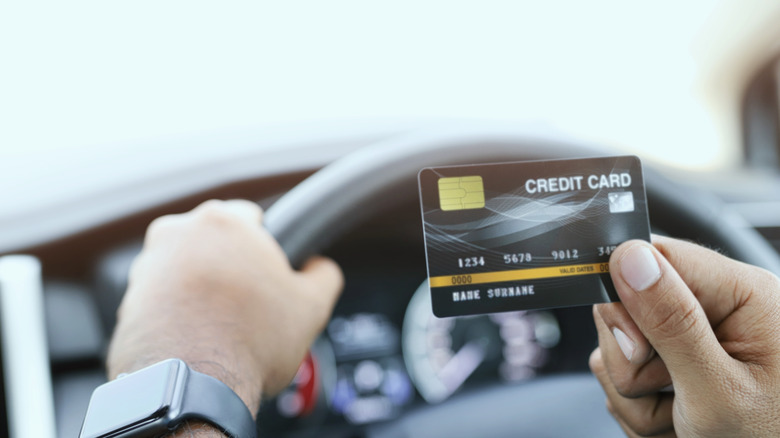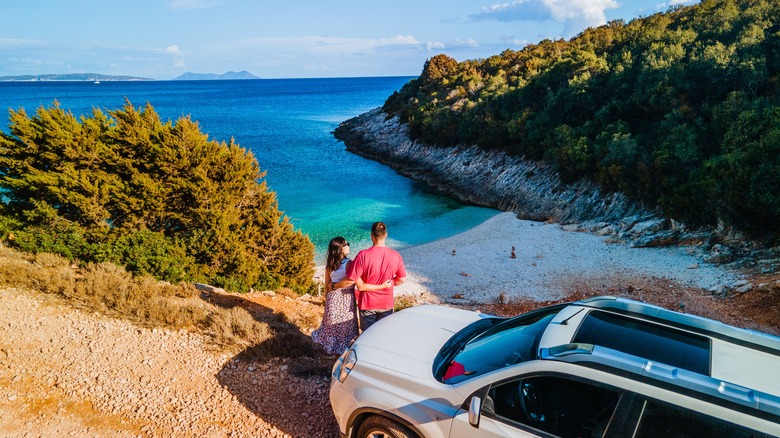Do You Really Need Rental Car Insurance? Here's What You Should Know
No one likes to be upsold. If you've ever spent time at a car rental counter, especially when renting a car at the airport after a long flight, it seems like the process drags on ... and on. In many cases, the conversation with the agent seems to entail a lot of "No, I'll pass on that." Maybe you don't really need a luxury car upgrade, a GPS, or a satellite radio.
To be fair, car rental agents aren't customer service reps. They're salespeople who work on commission, so upselling is an inherent part of their job. While you know that you don't need a luxury vehicle, you may be told that you absolutely do need rental car insurance. And the counter agent may be pretty convincing.
So, do you actually need car rental insurance? The answer is maybe not, but whether or not you should purchase insurance could depend on a few factors. Today, we'll go over when you should probably duck the oversell and when purchasing car rental insurance may be a prudent decision.
Your auto insurance might cover rental cars
In most cases, your auto insurance policy will extend the same coverage to a rental car, as long as you're renting a car for personal use. However, whether or not you should purchase rental car insurance may still depend on the type of auto insurance you own. It's important to keep in mind that your rental car will be covered up to the extent of your personal coverage and deductibles, and there may be instances to purchase additional coverage.
If your personal vehicle is already protected by collision and comprehensive insurance, then you probably don't need to purchase additional rental car insurance. However, if you only have liability insurance, then your insurance will help cover damage to another vehicle but not the rental car. In this case, you may be wise to purchase additional coverage in the form of a loss-damage waiver (LDW). By doing so, you won't be held financially responsible if the rental car is damaged.
Traveling for business versus personal travel
As we mentioned in the previous slide, your car insurance policy will typically only cover a rental car when used for personal travel. If you're on a business trip, then your personal coverage probably won't cover any injuries or damage while driving your rental car.
That said, before purchasing rental car insurance at the counter (and then presumably filling out an expense reimbursement form), you should check with your company. If your job tends to require travel, then your company may already have a commercial auto policy to cover the rental cars of employees.
If you're self-employed and traveling for business, and you have a history of deducting the expense of car rentals for tax purposes, then it may be wise to purchase rental car insurance. If you don't own commercial auto insurance, then your personal car insurance may not cover the rental car if something happens. And if your personal auto insurance provider notices a history of car rental deductions, they may use this history as evidence to withhold car rental coverage.
Premium credit cards may offer insurance
If you own a premium credit card, you may not need to bother with rental car insurance. A credit card with a high limit may offer primary coverage for your rental car, as it's able to handle the entire claim if something occurs. With a premium credit card, your personal auto insurance company might not even know about your car rental, which means they can't raise your rates because of it, either.
However, you may not actually need to own a premium credit card to forgo purchasing car rental insurance. If your credit card features a decent limit, then it could offer your secondary coverage. Although the lower limit may require you to file a claim with your personal auto insurance first, the credit card could assist with any supplemental cost, meaning you wouldn't need secondary coverage through rental car insurance.
But whether you own a premium card or a more standard credit card, you'd need to reserve and pay for your rental car using the specific credit card to qualify. It's also a good idea to call your credit card company ahead of time to confirm the details of providing car rental coverage.
Different types of rental car insurance
If you don't have your own personal car insurance or a credit card that offers coverage, then it may be wise to purchase rental car insurance. That said, you're still not typically required to do so. However, rental agencies usually cover their vehicles with minimal coverage, so if you're in an accident and don't have insurance, you could be liable for significant expenses.
Rental car agencies typically offer four types of insurance over the counter: liability insurance, the aforementioned loss-damage waiver (LDW), accident insurance, and personal effects insurance. Liability insurance covers the cost of another party's injuries and vehicle damage, accident insurance covers your medical bills and the medical expense of other passengers, the LDW covers damage or theft of the rental vehicle, and personal effects insurance covers any loss or damage of personal items in the rental car.
Something to keep in mind: Your health insurance may cover medical bills if you're in a rental car accident, meaning you wouldn't need accident insurance. Also, many travel insurance policies offer add-on options for rental car collision insurance, meaning you wouldn't need an LDW.
Purchasing rental car insurance while traveling abroad
While there may not be many circumstances you'd need to purchase rental car insurance when traveling domestically, traveling abroad is a different story. Many personal auto insurance policies won't cover rental cars internationally. The exceptions may be when traveling to Canada or Mexico. Your personal auto insurance may or may not cover rental cars in these two countries.
If you're traveling overseas, then you'll probably want to purchase rental car insurance. However, we should mention that over-the-counter rental car insurance — in any country — can be expensive. If you're already planning to purchase travel insurance for your next trip abroad (and you plan on renting a car), it may be cheaper to add rental car insurance to your travel insurance policy.
As we mentioned, agents will try to convince you that you need rental car insurance before handing over the keys. But, by planning ahead with a travel insurance add-on, you're literally and figuratively covered. You still won't be able to skip to the sales pitch, but you can at least ignore it.





